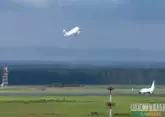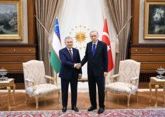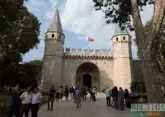Turkish President Recep Tayyip Erdogan will visit Uzbekistan on April 29-30. From there he will head towards South Korea. In Tashkent, during the talks with President Shavkat Mirziyoyev, they will discuss cooperation in the chemical, pharmaceutical, food, textile, automotive and agricultural sectors. One of the main issues will be the issue of Turkish investments in Uzbekistan's economy. The parties are expected to sign agreements worth $1 billion in total.
Turkey is confidently restoring the ties and positions in the East lost in the 1990s. Turkish experts believe that Ankara made a mistake, overestimating the prospects for joining the EU. Turkey's foreign policy was concentrated on the implementation of this plan back then. While Ankara unsuccessfully knocked at the European doors, its influence in the neglected Central Asia had been steadily weakening. Now it is trying to regain positions, by entering geopolitical competition with Iran and Saudi Arabia for a place in the Muslim world.
Erdogan's first visit to Tashkent in November 2016 is regarded by experts as a reset of the Turkish-Uzbek relations. Turkey understands very well that Uzbekistan and Kazakhstan are the two key players in Central Asia, and if Turkey's relations with Astana have long been established in economic and political spheres, its relations with Tashkent are only being developed, in particular, a visa-free regime between them was introduced in February 2018.
"Uzbekistan and Turkey are countries with two related peoples linked by a similar culture, language, customs and religion. The Turks call the modern territory of Uzbekistan "ataturk" - the land of their fathers and ancestors. At one time Turkey became one of the first countries to recognize independent Uzbekistan. The first diplomatic mission of the foreign state that opened in Tashkent was Turkish," Uzbek expert Abu-Ali Niyazmatov told Vestnik Kavkaza. According to him, since the first days of independence, Uzbekistan has adopted the so-called "Turkish model" for the development of its economy, and numerous representatives of the Turkish business have come to the republic. Turkish schools and lyceums were opened. The First President of the Republic of Uzbekistan, Islam Karimov, visited Turkey four times from 1991 to 1998 on official visits. Turgut Ozal (1993), Süleyman Demirel (1996, 1999), Ahmet Necdet Sezer (2000) and Recep Tayyip Erdogan (2016) visited Uzbekistan with return visits. However, the dynamically developing Uzbek-Turkish relations for various reasons suffered decline by the end of the 1990s. After President Shavkat Mirziyoyev led the republic, the situation in relations with Turkey has started to change drastically. In October 2017, President Mirziyoyev paid a visit to Ankara. The inter-parliamentary group of Uzbekistan's Oliy Majlis (Parliament), headed by first deputy chairman of the Uzbek Senate Sadik Safayev, was established to cooperate with the Grand National Assembly of Turkey.
"Turkey has always been the largest foreign trade partner of Uzbekistan. It ranked fourth in the foreign trade relations after Russia, China and Kazakhstan. By the end of 2017, the Uzbek-Chinese trade amounted to 1.5 billion dollars. But undoubtedly the existing trade potential between the two countries has not been fully realized. I think that bilateral relations between the countries will develop rapidly in the long term against the backdrop of liberalization of all spheres of Uzbekistan's life, initiated by Mirziyoyev," Abu-Ali Niyazmatov believes. According to him, during the visit of the Turkish President to Tashkent, a number of bilateral documents in the political, trade-economic, investment, transport-communication, educational and cultural spheres are expected to be signed. As a result, direct Turkish investments in the economy of Uzbekistan will increase. In short, Tashkent's expectations from the visit of the Turkish leader are very high.










